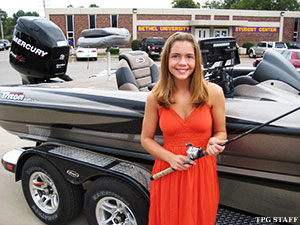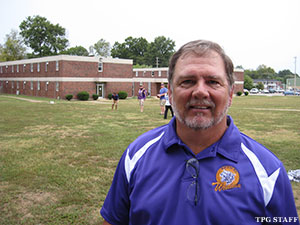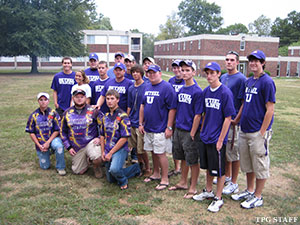
Somebody has spotted her. It’s an older man, stopped in his tracks outside Cathey’s Café early in the morning. He’s not staring, but he’s looking hard. He grins. He knows it’s her. "You gonna catch a 10-pounder today?!" he yells, loud enough for anyone on Waldron Street to hear. She smiles back. She’s been tired the last few days, and a bit ill. But she smiles back.

She goes inside the diner with her coaches. They order the heart-attacks-on-a-plate and tell jokes and make nice with the waitress. This is the latest good day in a long string of good days here in a small town in Western Tennessee. This group of student-athletes and coaches are going to drive out to a beautiful lake on a cool, cloudy day and do what they love: fish. But it’s not a hobby for these people like it is for so many others. This is the Bethel University Bass Fishing team – the first in the country to give scholarships. And Lauren Stamps, seated at the end of a long table, is the first woman ever to receive a college stipend to fish.
The food arrives. The waitress announces she wants a Bethel Bass Fishing cap. The team is happy to oblige. A prayer is said and the happy talk resumes – of the sport, the season ahead, and the pro circuit. This is all a dream come true – for the coach who dreamed this up only a year ago, for the students who will get an education because of their love of an outdoor sport, and for the tiny town that has a tiny claim to national fame.
But Lauren Stamps, age 19, doesn’t tend to think about all that. "I don’t know how to take it," she says in a whisper as the boys and men around her blab. "I’ve never had this kind of attention before. I just want to fish."
Randy Stamps also just wanted to fish. When his wife had a baby daughter, he carried her out to the boat from the time she was 3. "I just wanted her to talk fish and have fun," says Randy, a realtor. Randy and Lauren went out to Hurricane Creek in Houston County, Tennessee, which doesn’t deserve its name. It’s about 10 feet across and you can see clear to the bottom. Lauren loved spotting the fish, loved learning their names, loved wading in the water, loved catching crawdads, and eventually, when she was about 11, Daddy let Lauren hook a worm.
But it wasn’t about the fish. (Is it ever?) It was about the time they had. "It was a great escape from everyday life," Lauren says. Randy and his wife, Jennifer, got divorced. Lauren found new friends. Randy moved away, and worked weekends. Lauren became a teen. There was "the drama of high school," as she says. But they always went fishing. Sometimes they talked. Sometimes it was quiet. But there they were, dad and daughter, on Hurricane Creek. "It was our best time," Randy says. "It was our thing that we had together. No matter what."
Sure, there were some fishing lessons. How to cast a line. How to let the fish come to you. How to tug and reel. But fishing was only a hobby, measured in time in a boat rather than the size of the catch.
That changed.
Lauren didn’t enroll at Bethel. She went to nearby Jackson State. And at around that time, a charismatic, bearded man by the name of Garry Mason was making history. He’s a bit of a local legend in these parts – a fishing guide of the lovely Kentucky Lake and the founder of the Legends of the Outdoors Hall of Fame. Mason had a daughter who worked at Bethel and the A.D. there asked him for some ideas on starting a fishing team. Bethel had just reclassified itself as a university and enrollment had tripled to 3,000 since 1995, but it was still just a tiny Presbyterian school in the rural town of McKenzie, about halfway between Nashville and Memphis. Maybe Mason could think of a way to put Bethel on the map.

That he did. "Offer scholarships," he told the A.D. That had never been done before – anywhere. But it seemed so obvious, so perfect for a small school in an outdoors-obsessed region. The idea was approved on the spot. "Why didn’t I think of that?" said school president Bob Prosser. Mason was offered a job as head coach.
He took over and quickly recruited three boys – all with a deep love of bass fishing. It didn’t matter if they were stars-in-the-making, because Mason was so good at selling the idea. The outdoors press came running, and Mason did the rest with his constant cell phone chats with fishing bigwigs. (His cell phone ring, the sound of ducks squawking in a blind, is so frequent that an hour with him feels like a three-day hunting trip.) Mason brought in 18 sponsors, including Triton Boats and Mercury Marine, and he ceaselessly worked on more. He was a cross between a Madison Avenue ad exec and a Hollywood agent – somehow living in the hills of Tennessee.
Mason’s worst fear wasn’t failure – it was too much success. If the program took off and the NCAA made bass fishing an official sport, it would wreck his ability to turn little Bethel into a bass fishing monster. "I say this with all due respect to the NCAA," he says. "The school doesn’t have enough money to buy boats. Getting somebody to sponsor us is tough at this day and time. If some government body gets involved, they’re going to stop all of that."
The three recruits, named Jake, Jason and Jacob, did very well, competing with club teams at big schools like Auburn, Mississippi State and Tennessee even though one of the boys, team captain Jason Arnold, had to fish in a two-person boat by himself. Bethel placed third in the Southern Collegiate Bass Fishing Association and made waves nationally in only a few months.
Mason was just getting started.
It’s just a barbeque, but it’s also a small miracle. The Bethel University Bass Fishing team now has 20 students, all gathered around a grill waiting for burgers. They’re all freshmen with the exception of two sophomores, and almost every single one would not be at Bethel if it wasn’t for the fishing program. Many wouldn’t even be in college. Getting an education is expensive, and a $4,000 stipend – the school offers no full fishing scholarships yet – has made a huge difference. Some of these students will get a diploma because of fishing.
Lauren might be one of them. There she is, looking like somebody’s little sister over there, chasing some guys throwing the football around. She’s wearing a white T-shirt and sweats -- hardly the apparel of a campus siren -- but she’s far too dainty to be a tomboy.

Lauren was not happy at Jackson State. Her GPA had fallen from 3.7 to 1.5. She had failed English. But when word got to her about what Bethel was doing, it wasn’t long before she was meeting with Mason in the large administrative building about 200 yards from this grill. Mason pitched his plan. Lauren didn’t need much convincing. "Garry and I just seemed to click," she says. "We both knew it was meant to be."
During their two-hour talk, Mason hinted that there would be challenges to being the one girl on a boys’ team, telling her she was "going to have a lot of pressure on her," but that didn’t sway either of them. "I was so impressed with her overall poise," he says. "I took her out fishing and grown men take longer to learn. She has a great attitude." And Mason knew it wouldn’t hurt that Lauren is, in his words, "a very gorgeous young lady."
The three original team members, Jacob Hardy, Jason Arnold and Jake Lawrence, stand away from the grill, and away from the team. They’ve fought through a lot already. The three of them heard all kinds of comments both on and off campus about how they didn’t deserve scholarship money to fish. They had to explain to skeptical teachers why they should be excused for trips like the football team. They had to tell anyone who would listen that there is fishing practice at Bethel, Tuesdays and Thursdays, which includes learning how to back a boat up into the water and read a fish-finder. The three of them spent as much time fishing for respect as they did casting for actual fish. They often hit the water at dawn and stayed out until dinner, only to come back to campus and study. "If it was up to me," Hardy says, "we’d have eight players on the team." That would allow each competitor more time in the boat. But now the coach was bringing in dozens of freshmen with little or no fishing experience, all in the hopes of growing the program even if it costs wins. And nothing against Lauren, the sophomore men say, but would she be on the team if she wasn’t a pretty girl? "I like the idea of this," says Hardy, "but I don’t want it to be turned into any girl can come on our team just because she is a girl."
Nobody has said anything like this directly to her, and she insists the boys have "treated me like a little sister," but Lauren feels the doubt. Even a supportive friend on the team, Devin Bargatze, admits his girlfriend has an issue with Lauren being teammates with her boyfriend. Lauren doesn’t care so much about that, but she worries about being behind. "She gets nervous," her dad says, "and wants to make sure she’s doing it right."

Bass fishing is so different from the kind of fishing Lauren knows. You can’t see the fish, for one thing. You have to use a GPS system. You have to learn a new type of reel. You have to run the trawling motor. Heck, you have to figure out how to get the boat into the water. And most importantly, you have to compete. While Jake and Jason have their eye on turning pro and competing with the best in the world, Lauren just wants to figure everything out and catch fish. "It sucks that a girl on the team is getting the same amount of time as we are," says Jason. That’s not Lauren’s fault, of course, and the boys don’t blame her directly, but fishing is the ultimate individual sport. Mason may want to grow the program, but out on the water, it’s pretty much every man for himself. The men on the team want to make a living doing this. Lauren likes that idea, but she talks more about joining the Coast Guard. "If I make it pro, great," she says. "If I don’t, I don’t." So while her teammates catch every episode of Bassmasters, Lauren goes to church. Following the pros too closely, she says, "makes me nervous." And it doesn’t help when Coach Mason jokes that "the boys follow her around, panting." The old days with her dad seem so far away, back when "little fish were huge fish."
Now the huge fish might not be big enough.
Lauren’s dad wasn’t able to go to her first fishing tournament this season. His real estate business is struggling, and he needs to spend every possible moment on the job. "I wish I coulda gone," Randy says. "My business has been, golly, really bad. I’m just hanging on. I wish I was there. I shoulda been."
Lauren understood, though, and she was excited for the two-day tournament against Logan Martin. She started out well, catching a 2 ½ pounder in her two-person boat on a cloudy Saturday. Then, as she got set to throw another line, she heard her freshman partner say, "Lauren, don’t cast." She looked at him quizzically. "Don’t freak out," he said, "but you have a hook in your face."
Lauren’s teammate, who shall remain nameless, had cast a hook directly into her cheek – a half-inch below her right eye. Lauren was too pumped with adrenaline to feel any pain.
"Well," she told the kid in her Tennessee drawl, "YANK IT OUT!"
The teammate stood there in shock, having been instructed by a girl to remove the hook he dug into her face. "I don’t think he knew what to do," Lauren said later. "I don’t think he wanted to hurt me."
Lauren wanted to keep fishing, but Mason insisted on medical attention. So he took Lauren to a local ER so she could get a tetanus shot and a stitch.

Then she came back to the lake to fish some more.
She got back in the boat and looked for her tackle box. It wasn’t there. Somehow, it had fallen into the lake. Her cell phone was in there, so she wouldn’t be able to call her dad and tell her what happened. And for a split-second, Lauren wondered if someone had sabotaged her.
That’s when, for the first time that day, she started to get angry.
But as she has learned to do, Lauren fought through it. "You have to go through barbed wire fences," she says, "to get to the apples."
There would be more barbed wire. Lauren’s grades slipped. She landed on academic probation, and was held out of the remainder of the tournaments. Her dad insists it wasn’t because of fishing, but he confesses fishing didn’t help. Lauren’s second semester was better, but there is still worry about the future. After all, the downside of having a bass fishing scholarship is if her grades don’t keep up, Lauren can’t afford to keep going to school at Bethel. "I think she’ll be all right," says Mason, always upbeat. "But the truth is, yes, there is a chance she’ll lose her scholarship if her grades don’t improve. That’s why it’s a scholarship."
The team did great – winning the Southern Collegiate points series championship and beating Auburn by 25 pounds – but technically, Lauren’s not on the team right now.
She’s still trying to be a fighter, despite everything. She knows the weight on her, from within and from without. She even says she’s changed her mind about a future in fishing. "I want to go pro," she says, "and I want to go really far. Something about that tournament. Something about competing. It made me want it more. It made me want it so bad that I couldn’t stand it."
Lauren will spend the summer clinging to the memory of that one taste of tournament fishing. It was enough to make her somewhat of an historical figure. It was enough to make her dad extremely proud. But it was not enough to make her happy, and it was not enough to prove herself in the eyes of doubters.
That’s the problem with being a pioneer: You start out doing something unprecedented, and then things really get difficult.
-- Eric Adelson can be reached at adelson@yahoo-inc.com.




